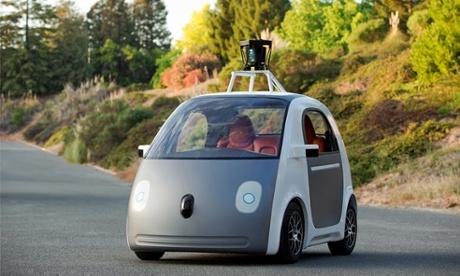 |
Google's driverless car (Google) |
이날 공개된 이 2인승 차량에는 운전대, 브레이크와 가속 페달등이 없고 출발 정지 버튼만 있다. 대신에 내장된 센서와 컴퓨터 시스템을 통해서 운행되기때문에 안전하다고 밝혔다.
구글측에서는 아마도 내년에 상용화 될 것 같다고 밝혔다.
과거에 프리우스나 렉서스 SUV 로 무인 자동차 운행을 테스트했는데 그때에는 안전요원이 탑승했지만 이번에는 아무도 탑승하지 않은 상태에서 시험주행을 마쳤다는 것이다.
또한 성능 개선작업을 마쳐 보행자와 버스, 정지 신호, 횡단 보도 교통정리 자원 봉사자등의 수신호를 인식할 수 있는것으로 알려졌다.
다만 최대 걸림돌은 법제화이다. 캘리포니아 법규상 자동차에는 핸들, 페달등이 달려 있어야만 한다. (Khnews@heraldcorp.com)
<관련 영문 기사>
Google: We're building car with no steering wheel
It doesn't need one because it drives itself.
The two-seater won't be sold publicly, but Google said Tuesday it hopes by this time next year, 100 prototypes will be on public roads. Though not driving very quickly _ the top speed would be 25 mph (40 kph).
The cars are a natural next step for Google, which already has driven hundreds of thousands of miles in California with Lexus SUVs and Toyota Priuses outfitted with a combination of sensors and computers.
Those cars have Google-employed ``safety drivers'' behind the wheel in case of emergency. The new cars would eliminate the driver from the task of driving.
No steering wheel, no brake and gas pedals. Instead, buttons for go and stop.
``It reminded me of catching a chairlift by yourself, a bit of solitude I found really enjoyable,'' Sergey Brin, co-founder of Google, told a Southern California tech conference Tuesday evening of his first ride, according to a transcript.
The electric-powered car is compact and bubble-shaped _ something that might move people around a corporate campus or congested downtown.
Google is unlikely to go deeply into auto manufacturing. In unveiling the prototype, the company emphasized partnering with other firms.
The biggest obstacle could be the law.
Test versions will have a wheel and pedals, because they must under California regulations.
Google hopes to build the 100 prototypes late this year or early next and use them in a to-be-determined ``pilot program,'' spokeswoman Courtney Hohne said. Meanwhile, by the end of this year, California's Department of Motor Vehicles must write regulations for the ``operational'' use of truly driverless cars.
The DMV had thought that reality was several years away, so it would have time to perfect the rules.
That clock just sped up, said the head of the DMV's driverless car program, Bernard Soriano.
``Because of what is potentially out there soon, we need to make sure that the regulations are in place that would keep the public safe but would not impede progress,'' Soriano said. (AP)







